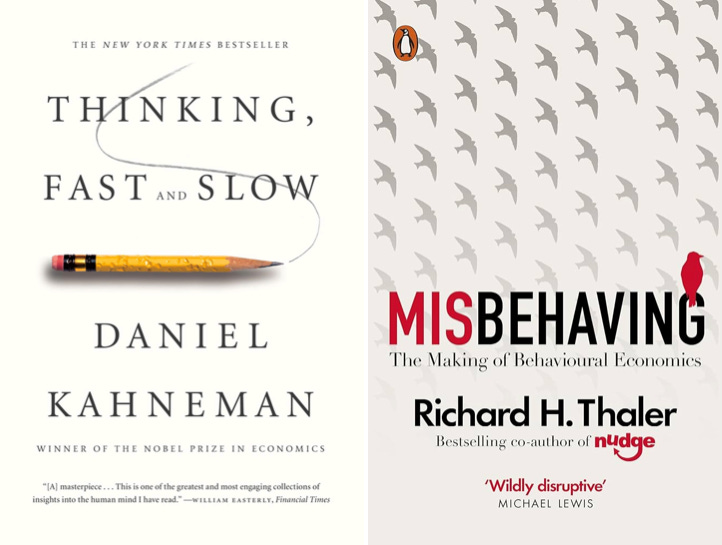There’s No Free Lunch—Some People Even Pay Twice
A Lesson in Irrationality, Rational Decision-Making, and Behavioral Biases in Investing
China’s NPC Standing Committee meeting will conclude tomorrow, with announcements expected soon on the size of the economic stimulus. This generates a wave of noise and speculation. In light of this, I’ve chosen not to follow the crowd or add to the noise, but instead to focus on misconceptions and behavioral biases.
New Name, New Features—Same Focus
Before getting into this week’s topic, I wanted to share a few announcements about this Substack. Some of you may have noticed the name change. When I first began writing here, I didn’t put much thought into the name. But with the incredible support and feedback from all of you—which I’m truly grateful for—I decided it was time for an update. I’ve chosen a new name, and in the coming weeks, you’ll see a few new features as well. One of them is a chat room, where we can exchange ideas in real-time and discuss topics more interactively.
Despite the name change, the focus remains the same. Recently, I’ve leaned toward macro topics, but with third-quarter earnings reports arriving next week, I’ll be shifting back to company-specific analysis, looking closely at the numbers and their impact on individual stocks.
I’ll also be sharing a new investment idea soon. I’ve been building a position in this company for a while and will be visiting them next week. Once I’m ready, I’ll publish the full details—so stay tuned!
Game Theory’s Rational Agents and Real-World Biases
Turning to today’s topic, which centers on rational decision-making and misconceptions, let’s start with the origins of game theory.
When John von Neumann and Oskar Morgenstern first developed game theory in their groundbreaking work, Theory of Games and Economic Behavior—a book you can freely download here—they assumed that agents are fully rational. This meant that each participant acts consistently to maximize their own objectives, using all available information to make decisions that align with their best interests.
While von Neumann and Morgenstern’s framework provided a structured approach to analyzing strategic interactions, it became evident that real-world decision-making often deviates from pure rationality. This realization led to the emergence of behavioral economics, a field that examines how psychological factors influence economic decisions. Pioneers like Daniel Kahneman and Amos Tversky introduced concepts such as prospect theory, highlighting systematic biases in human judgment. Richard Thaler further advanced the field by exploring how individuals’ choices often contradict traditional economic predictions.
Some of their work has even been published in popular science books, making these insights accessible to a wider audience.
Recently, I encountered an example of absolutely irrational behavior firsthand.
My dinner with Mr. Enthusiasm
The other night, I had dinner with someone I’d been introduced to—let’s call him Mr. Enthusiasm. He was full of praise for a particular fund manager1, saying this manager had “deep insights” and even “strong connections to Warren Buffett.”
Later that evening, I decided to look into this highly praised fund. What I found was… revealing. Essentially, most of the fund’s investments are either direct Berkshire Hathaway shares or stocks that Berkshire already owns. With this setup, the fund’s performance will almost certainly track closely to that of Berkshire Hathaway—it’s too aligned to do otherwise.
The fund does hold some stocks not owned by Berkshire, and Berkshire, in turn, holds stocks not included in the fund. But these differences are a coin flip in terms of impact; either the fund’s unique holdings or Berkshire’s might slightly outperform. In the end, any deviation from Berkshire’s performance will likely be small and random.
This is a textbook example of irrational behavior: paying extra for a portfolio that will almost certainly mirror Berkshire Hathaway’s performance, plus an added management fee.
There are probably a number of behavioral biases at play here—authority bias, status quo bias, maybe even the sunk cost fallacy, among others.
In any case, this setup virtually guarantees underperformance compared to simply buying Berkshire Hathaway shares directly. Yet, Mr. Enthusiasm is convinced he’s found a “free lunch” investment.
There’s an old saying in economics, often attributed to Milton Friedman: “There’s no such thing as a free lunch.” While I actually somewhat disagree with this—there are situations where recognizing and capitalizing on group misconceptions can give you an edge, resulting in gains beyond what you’d expect if everyone acted rationally—it’s still surprising to see that some people aren’t just looking for a free lunch; they actually choose to pay double.
China – The Fear of Being Betrayed
In relation to China, one of my favorite examples of irrational behavior comes from the work of Richard Zeckhauser, who explores how the fear of being betrayed can lead people to demand disproportionately high payoffs. I’ve written about Zeckhauser’s article before—here in connection with Alibaba when it traded in the low 70s, and here more generally—and I consider it one of the few truly innovative pieces on investment in recent decades, so I’m not tired of promoting it.
This fear is particularly relevant in China, especially with the VIE structure and other unique regulatory frameworks that can amplify concerns around trust and risk. If you can spot misconceptions, you can often capitalize on the opportunities they create.
Being a possible sucker may be an advantage if you can gauge the probability. People are strongly averse to being betrayed. They demand much stronger odds when a betraying human rather than an indifferent nature would be the cause of a loss (Bohnet and Zeckhauser, 2004). Given that, where betrayal is a risk, potential payoffs will be too high relative to what rational decision analysis would prescribe.
— Richard Zeckhauser—
That’s all for today—remember, only invest if the odds are in your favor.
This isn’t a criticism of the fund manager, who is perfectly entitled to run his fund as he sees fit. I won’t mention his name, and there’s absolutely nothing wrong with his approach. My critique is directed at the decision of investors who choose to pay for this setup—it’s their choice, not the fund manager’s issue.




Is Mr. Enthusiasm actually Mr. Market’s evil twin brother?